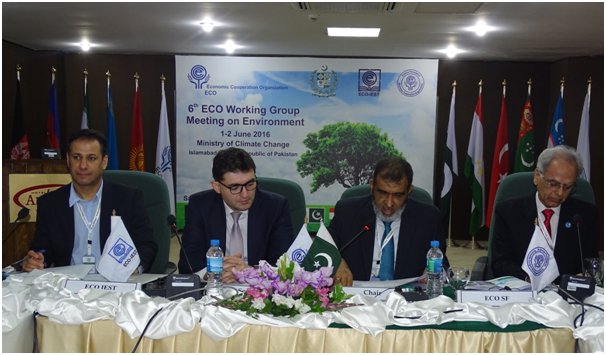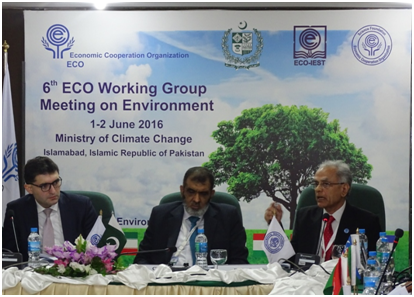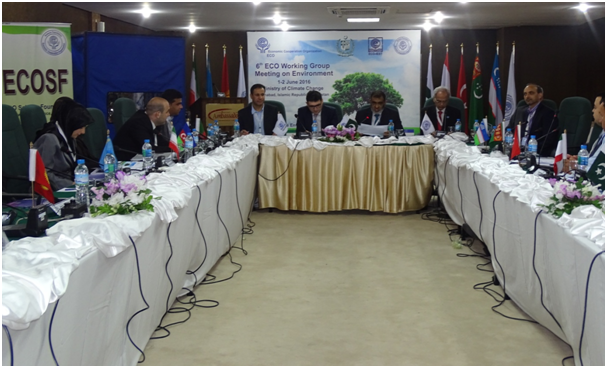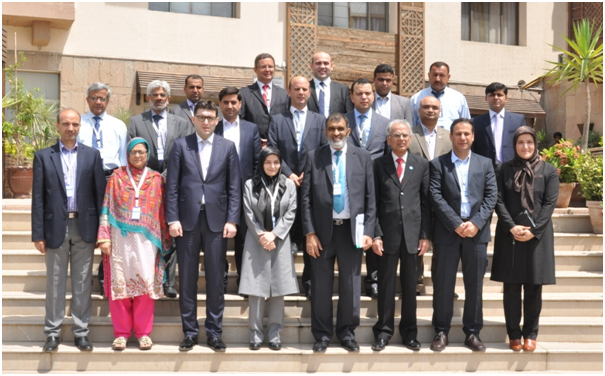6th ECO Working Group Meeting on Environment, 1-2 June 2016, Islamabad- Pakistan
Go Back

Organized by
Government of Pakistan, Ministry of Climate Change
ECO Science Foundation (ECOSF)
Directorate of Energy & Environment of ECO Secretariat
ECO Institute of Environmental Science and Technology (ECO-IEST)
The 6th ECO Working Group Meeting on Environment was held on 1-2 June 2016 in Islamabad, Islamic Republic of Pakistan. The meeting was organized by Ministry of Climate Change of I.R of Pakistan, ECO Science Foundation (ECOSF), ECO Secretariat and ECO Institute of Environmental Science and Technology (ECO-IEST). The delegates from Islamic Republic of Afghanistan, Republic of Azerbaijan, Islamic Republic of Iran, Islamic Republic of Pakistan, Republic of Tajikistan, Republic of Turkey, Turkish Cypriot State (ECO observer), as well as UNESCO, ECO-IEST, ECOSF and ECO Secretariat attended the meeting.

The meeting was inaugurated by Mr. Syed Abu Ahmad Akif, Federal Secretary for Ministry of Climate Change of Pakistan. The Federal Secretary Climate Change welcomed all the delegates for attending the meeting and underscored the importance of enhancing synergy and coherence among key stakeholders in the ECO Region and called upon Member States to strengthen their efforts for close collaboration in the field of climate change, biodiversity, sustainable forest management and other related environmental areas especially in the context of UNFCCC COP-21 Paris Agreement on climate change which certainly will serve as conduit for effective implementation of ongoing and future joint initiatives for the ECO Region. He acknowledged the ECO Secretariat’s active efforts in convening Ministerial and high level ECO meetings in the field of environment. He also called upon the ECO Secretariat and the Member States to convene more events on environment as a major issue of our times. The Federal Secretary hoped that the Meeting would provide ample opportunities to build on existing arrangements and frameworks on environment in the ECO region.
 Prof. Dr. Manzoor H. Soomro, President ECOSF in his speech in the inauguration ceremony thanked the Ministry of Climate Change of Pakistan hosting the meeting and ECO Secretariat for coordinating the Meeting in collaboration with ECOSF and ECO-IEST in Islamabad-Pakistan. He briefly apprised thet Meeting about ECOSF’s recent activities including workshops and conferences held on biosphere reserves in the ECO Member States. He mentioned that ECOSF had a pleasure to host the 1st meeting of ECO Experts on Climate Change and Biodiversity in Pakistan in Nov 2013 with the cooperation of Government of Pakistan and support/contribution by ECO Secretariat and expressed pleasure to have co-organized the 6th meeting of experts- the ECO Working Group on Environment in Islamabad again. He further said that we all get affected from the climatic and environmental change issues and politically, there is always a talk about combating and mitigating the problems; but to address the issues, the education and research are mandatory to prepare the implementable policies and strategies in line with the international commitments and relevant UN Sustainable Development Goals. Dr. Soomro also shared that ECOSF promotes research in collaboration among ECO member states; and Environment, Climate Change, Food Security & Water, Energy, Biotechnology and Nanotechnology are the priority areas for research funding. ECOSF also organizes and funds S&T conferences and Capacity Building/Training Workshops as well as provides Travel Grants to researchers and scientists of member countries for participation in such events mainly in other countries of ECO, he said. Dr. Soomro also informed the Meeting that ECOSF launched the Inquiry Based Science Education- IBSE, last year (June 2015) in Astana-Kazakhstan in collaboration with its international partners, which include; La main a la pate (LAMAP) Foundation of France, Inter Academy Partnership – Science Education Programme (IAP-SEP) and International Science, Technology and Innovation Centre for South-South Cooperation under the auspices of UNESCO (ISTIC), with whom, ECOSF has signed MoUs for collaboration in an area where these organizations are global leaders. In his statement, the President ECOSF informed that UNESCO is an important partner and collaborator of ECOSF, and ECOSF is active in promotion of Biosphere Reserves with UNESCO in Pakistan and in the Region by involving UNESCO Cluster offices in Tehran and Almaty as well as the UNESCO country offices and Regional Science Bureau for Asia and Pacific Region based in Jakarta. ECOSF and UNESCO also organized a capacity building workshop for the Afghan nationals in 2015 with the aim to develop the foundation within the natural and social sciences for the rational and sustainable use and conservation of the resources of the biosphere and for the improvement of the overall relationship between people and their environment in Afghanistan. He proposed that ECO Environmental activities could be linked up with UNESCO Regional Networks of Biosphere Reserves for promotion of synergies. He also further informed that ECOSF is an accredited Stakeholders/Observers of the Intergovernmental Science Policy Platform on Biodiversity and Ecosystem Services (IPBES) and other various forums, therefore, from this platform, he encouraged Member States to benefit from ECOSF collaborators (www.eco4science.org) and also put up joint research projects to ECO Science Foundation for funding through respective government authorities. In the end, he hoped that the Meeting would go well and the expected outcome of the meeting would be achieved.
Prof. Dr. Manzoor H. Soomro, President ECOSF in his speech in the inauguration ceremony thanked the Ministry of Climate Change of Pakistan hosting the meeting and ECO Secretariat for coordinating the Meeting in collaboration with ECOSF and ECO-IEST in Islamabad-Pakistan. He briefly apprised thet Meeting about ECOSF’s recent activities including workshops and conferences held on biosphere reserves in the ECO Member States. He mentioned that ECOSF had a pleasure to host the 1st meeting of ECO Experts on Climate Change and Biodiversity in Pakistan in Nov 2013 with the cooperation of Government of Pakistan and support/contribution by ECO Secretariat and expressed pleasure to have co-organized the 6th meeting of experts- the ECO Working Group on Environment in Islamabad again. He further said that we all get affected from the climatic and environmental change issues and politically, there is always a talk about combating and mitigating the problems; but to address the issues, the education and research are mandatory to prepare the implementable policies and strategies in line with the international commitments and relevant UN Sustainable Development Goals. Dr. Soomro also shared that ECOSF promotes research in collaboration among ECO member states; and Environment, Climate Change, Food Security & Water, Energy, Biotechnology and Nanotechnology are the priority areas for research funding. ECOSF also organizes and funds S&T conferences and Capacity Building/Training Workshops as well as provides Travel Grants to researchers and scientists of member countries for participation in such events mainly in other countries of ECO, he said. Dr. Soomro also informed the Meeting that ECOSF launched the Inquiry Based Science Education- IBSE, last year (June 2015) in Astana-Kazakhstan in collaboration with its international partners, which include; La main a la pate (LAMAP) Foundation of France, Inter Academy Partnership – Science Education Programme (IAP-SEP) and International Science, Technology and Innovation Centre for South-South Cooperation under the auspices of UNESCO (ISTIC), with whom, ECOSF has signed MoUs for collaboration in an area where these organizations are global leaders. In his statement, the President ECOSF informed that UNESCO is an important partner and collaborator of ECOSF, and ECOSF is active in promotion of Biosphere Reserves with UNESCO in Pakistan and in the Region by involving UNESCO Cluster offices in Tehran and Almaty as well as the UNESCO country offices and Regional Science Bureau for Asia and Pacific Region based in Jakarta. ECOSF and UNESCO also organized a capacity building workshop for the Afghan nationals in 2015 with the aim to develop the foundation within the natural and social sciences for the rational and sustainable use and conservation of the resources of the biosphere and for the improvement of the overall relationship between people and their environment in Afghanistan. He proposed that ECO Environmental activities could be linked up with UNESCO Regional Networks of Biosphere Reserves for promotion of synergies. He also further informed that ECOSF is an accredited Stakeholders/Observers of the Intergovernmental Science Policy Platform on Biodiversity and Ecosystem Services (IPBES) and other various forums, therefore, from this platform, he encouraged Member States to benefit from ECOSF collaborators (www.eco4science.org) and also put up joint research projects to ECO Science Foundation for funding through respective government authorities. In the end, he hoped that the Meeting would go well and the expected outcome of the meeting would be achieved.
Earlier, Mr. Orkhan Zeynalov, Director for Energy, Minerals and Environment (EME) of ECO Secretariat in his opening statement, expressed his appreciation to the Government of Pakistan particularly the Ministry of Climate Change for hosting the 6th ECO Working Group Meeting on Environment in collaboration with ECO Science Foundation for providing necessary facilities for delegations and successful proceedings of the Meeting. In ECO policy statement, the Meeting was also briefed by ECO Director about ECO’s overall environment profile, including recent progress made in advancing regional environment, climate change, forestry and biodiversity agendas as well as ongoing projects and future engagements.
Mr. Sasan Rabieh, Coordinator for ECO-IEST also made opening statement and thanked the Ministry of Climate Change of Pakistan for holding the Meeting in a timely manner. He briefed the Meeting about the two important ECO projects being undertaken by ECO-IEST on overall environmental issues and desertification impacts in the ECO Region in line with mandates given by the ECO decision making bodies as well as other recent engagements being carried out by the Institute. He requested the ECO Member States to provide their general support to the ECO-IEST for making more progress in different areas of collaboration for proper implementation of the projects.
Mr. Syed Muhammad Raza Shah, National Programme Officer of UNESCO Pakistan also made a statement on behalf of Director UNESCO Pakistan and briefly highlighted activities of UNESCO. In the statement, it was appreciated and acknowledged that UNESCO and ECOSF have been working closely together on different areas of science including Man and Biosphere (MAB) Programme. Mr. Shah proposed that collaboration of ECO Secretariat and ECOSF can be very supportive for organizing 8th Meeting of South and Central Asia MAB Network (SACAM) in Almaty- Kazakhstan in August 2016. It was also proposed that under the UNESCO's International Hydrological Programme (IHP), the three organizations (UNESCO, ECO and ECOSF) can work jointly to rehabilitate the Karez (Qanat) System of Pakistan with the support of UNESCO Iran and Iranian water experts. Mr. Shah further said that, UNESO, ECO Secretariat and ECOSF can also jointly work in many other programmes in the region as well..

The delegates of ECO Member States also made presentations/statements on behalf of their countries and highlighted activities and programme on Environment. They highlighted major challenges to the Earth’s environment; rapidly rising temperature of the Earth triggering to heat-waves, unexpected floods, melting of glaciers, deforestation, land degradation, hazard to pollutions, water scarcity, drought, dust haze and sand storms, trans-boundary environmental issues, birds migration, depleting marine life, over exploitation of natural resources and lack of effective mitigation and adaptation strategies. In this context, they called for urgent need for a close and enhanced cooperation among ECO Member States on public awareness, information sharing and adopting sound and synergic measures to address the cross-cutting environment issues in the ECO Region.
While appreciating the collaboration established by ECO Science Foundation and UNESCO, the Meeting welcomed the proposal of UNESCO Representative to the ECO Secretariat to extend its support to UNESCO and ECOSF in convening the 8th Meeting of SACAM Network in August 2016 in Almaty- Kazakhstan and requested ECO Member States to participate in this important event and urged for potential ECO Regional joint collaborative initiatives with UNESCO for future cooperation in biosphere reserves.

The meeting finally concluded on 2 June and made the following recommendations/decisions. The Meeting;
- Called for establishment of Ad-Hoc Group/Task Force to formulate and develop ECO Regional Adaptation Programme.
- Urged Member States to follow up and implement decisions of Paris Agreement on Climate Change agreed during the COP-21 in Paris in December 2015 and signed by world leaders in May 2016 in New York and to synergize efforts for identifying and formulating common approaches and policy options for enhancement of regional actions on climate change;
- Called for concerted actions for further synergy and coherence in line with decisions of the ECO Environment Ministers and ECO Council of Foreign Ministers (COM) decisions;
- Called for strengthening regional cooperation and dialogue on combating desertification, with special emphasis on dust haze and sand storms, including through capacity building and training activities to be taken in close partnership with UNCCD;
- Urged the Member States to incorporate key action points of the UNEA-2 Resolution in their national and regional environmental agendas;
- Requested the Member States and ECO Secretariat for implementation of the key action points agreed during the 2nd ECO Consultative Meeting held on 27 May 2016 on the sidelines of the 2nd UNEA in Nairobi;
- Requested the ECO Secretariat in collaboration with the ECO-IEST, UNEP and other relevant agencies, to organize training workshops to help identify and build capacity for the optimal ECO regional approach to green economy in the context of outcome document of Rio+20 in line with the decision of the 5th ECO Ministerial Meeting on Environment;
- Called for a regional approach to the environmental impacts in the post disaster situations and adaptations, for addressing the man-made disasters, and requested the ECO Secretariat to prepare necessary requirements for such regional approach, including through experience sharing, capacity building and training activities;
- Emphasized on the Member States’ timely submission of the National Progress Reports to the ECO Secretariat annually within the first quarter of each calendar year to help identify weaknesses and areas needed to be meticulously addressed by both the ECO Secretariat and the Member States;
- Urged Member States to communicate updated particulars of their National Focal Points to the ECO Secretariat by end of July 2016;
- Requested the Member States to provide their scientific materials enabling the ECO Secretariat and ECO-IEST to publish ECO Bulletin on Environment in line with the recommendations of the 5th ECO Ministerial Meeting on Environment;
- Noted the grave impacts of air pollution and waste management and called upon Member States and ECO to formulate regional policies and joint efforts in dealing with those environmental issues in a balanced and coherent manner;
- Requested the Secretariat to continue its collaborative efforts for active engagements with UNFF and seek their technical and financial assistance in convening more workshops on Sustainable Forest Management (SFM) in continuation of two previous joint workshops with UNFF in Tehran (April/May 2014 and October 2015);
- Considered trans-boundary water issues for future course of cooperation among ECO Member States;
- Called upon the ECO Secretariat to establish partnership frameworks with regional organizations working on environment and climate change issues, including, but not limited to the South Asian Cooperative Environment Programme (SACEP), Organization of Islamic Cooperation (OIC), Organization of the Black Sea Economic Cooperation (BSEC), and ASEAN.
- Recommended convening of “ECO Technical Workshop on Combating Desertification with a Special Emphasis on Dust Haze and Sand Storm in the ECO Region” in 2016/2017.
Recommended that a common ECO Regional approach should be developed for efficient and proper implementation of the SDGs and initiatives be identified for access to funding from Green Climate Fund (GCF), Global Environment Facility (GEF) and etc.
The Meeting was wound up with the mutual vote of thanks by the President ECOSF, DG (Environment) Ministry of Climate Change of Pakistan and Director (EME) from ECO Secretariat. In late afternoon, the Meeting delegates paid a visit to ECOSF premises and appreciated the efforts of the Foundation in setting up its new permanent offices.